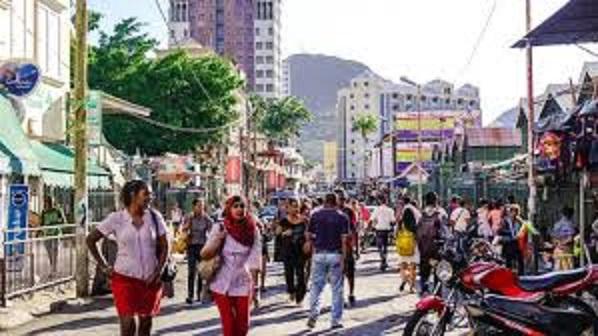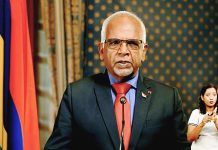Africa-Press – Mauritius. The Finance Minister, Pravind Jugnauth, is reported as having said that a bright future awaits the country in 2017. Apparently he is not unduly perturbed by the departure of the leader of the PMSD and practically all of his party members from their positions in government including as parliamentarians.
In fact, Pravind Jugnauth added that the Prosecution Commission Bill – certain aspects of which were seemingly the bone of contention – is still on the agenda and is going to be brought into the National Assembly when it resumes business in March.
One presumes that he would not make such a definitive statement if he were not certain of garnering the three quarters of votes needed, and the inference from this can only be that some work is underway to ensure such an outcome.
Which means filling the void left by the PMSD, in terms of numbers, from the ranks of those already in the National Assembly. It is therefore logical to expect some major developments on this front.
Will that include and accommodate transfugisme, so much denied by all political parties – and yet practised – whenever it was convenient to do so? Clearly, there is excitement ahead.
Coalitions, alliances, break-ups, adore ce que tu as brûlé, brûle ce que tu as adoré have become part of our political landscape in the more recent times.
As we enter what may well be a different, shaky and perilously uncertain phase of our country’s future, where fierce antagonisms to the point of mutual destruction – and along with it the polity – it is perhaps important to remind those who have set themselves up to rule the country how it came to be what it is, a prosperous small island state.
Because what we have inherited today by way of civil, political, social and cultural rights is the result of foresight by those who were in the forefront of the battle for Independence and, on this count, it is instructive to be enlightened by the analysis and appreciation of impartial observers.
Thus, a study entitled ‘Coalitions, Capitalists, and Credibility: Overcoming the Crisis of Confidence at Independence in Mauritius’ (May 2009) by Deborah Bräutigam, International Development Program School of International Service American University Washington, DC with Tania Diolle, Centre for Applied Social Research, had this to say by way of Executive Summary:
‘Few countries in the developing world have solved the puzzle of governing for broad‐based prosperity. The multi‐ethnic Indian Ocean island nation of Mauritius is an exception.
An isolated plantation economy at the end of the colonial period, dependent on the export of sugar, with a deeply divided population that had just experienced violent urban riots, Mauritius was transformed between 1968 and 1988.
On multiple measures ‐‐ growth, stable democracy, social welfare, equity ‐‐ Mauritius has earned its status as a development “superstar”. A skilful mix of policies encouraged global competition in some areas (tourism, export manufacturing) while taking full advantage of trade preferences in others (sugar).
Leaders were accountable for performance to domestic constituents, but kept their eyes on the outside world, experimenting, learning, adapting. They respected and strengthened key governance institutions: skilled bureaucracy, an independent judiciary, a free press, an inclusive electoral system.
Most importantly, an elected leader, avowedly socialist, was able to convince the business community of his government’s credible commitment to their prosperity, and to wrest from them the understanding that their prosperity would have to be shared in order to underwrite the social stability of the country.
Social democracy would be combined with managed capitalism. Using a process‐tracing methodology, this paper examines how, at the critical juncture of independence, this commitment was forged, and how it was sustained through being embedded into formal and informal institutions.
Violent and divisive elections in 1967 launched Mauritius into independence, but the coalition for development took shape through a painstakingly negotiated government of national unity.
This brought the party of the economic elite into a coalition government headed by the socialist Labour Party, a firm sign of the latter’s commitment to market‐based development.
The national unity government provided the framework for decisions in three key policy arenas: upscale tourism; protected sugar exports into Europe; and export processing zones (EPZs). Trust between the public and private sectors was built through three principal means.
First, key public and private sector leaders used symbolic, public gestures as signals of commitment to cooperation, thereby shifting societal perceptions and easing a potentially dangerous ethnic polarization.
Second, the business class organized itself into a unified, cross‐ethic constituency, with a peak association that could negotiate, and speak with a single voice.
Third, government leaders and the private sector fostered dense clusters of consultation: regular formal and informal arenas for government‐business interaction.
Why did Mauritians have the desire and ability to unify? The paper argues that four factors explain this exceptionalism. (1) Education: The leaders who negotiated these new relationships were exceptionally well‐educated.
Many were graduates of the main island’s competitive, elite government secondary school, Royal College. At least half of the national unity cabinet of 21 people had earned university degrees in London.
(2) Societal support: A free media, new civic associations, and even the Catholic Church gave repeated and vocal societal support.
(3) Transnational networks: These provided the ideas (Fabian socialism, export processing zones) and resources that created a concrete hope for the future.
Finally, (4) Systemic vulnerability (that is, absence of resources or geopolitical patrons; a price‐volatile monocrop; hurricanes and droughts): This fostered a sober realization (italics added) that the country needed to unify, or sink.
’ We are at a stage today where, unless we regain that sober realization anew, we may sink rather than unify and swim. What will it be? TP Saran
For More News And Analysis About Mauritius Follow Africa-Press







